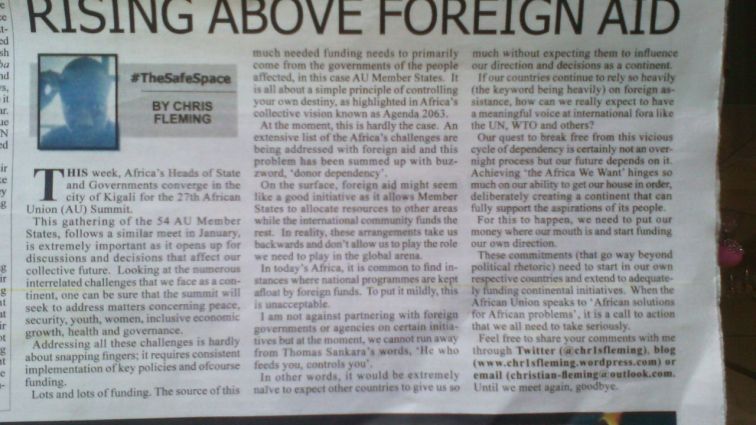Copy of #TheSafeSpace column published in the Times of Swaziland on the 13th of July 2016:

This week, Africa’s Heads of State and Governments converge in the city of Kigali for the 27th African Union (AU) Summit. This gathering of the 54 AU Member States, follows a similar meet in January, is extremely important as it opens up for discussions and decisions that affect our collective future. Looking at the numerous interrelated challenges that we face as a continent, one can be sure that the Summit will seek to address matters concerning peace, security, youth, women, inclusive economic growth, health and governance.
Addressing all these challenges is hardly about snapping fingers; it requires consistent implementation of key policies and ofcourse funding. Lots and lots of funding. The source of this much needed funding needs to primarily come from the Governments of the people affected, in this case AU Member States. It is all about a simple principle of controlling your own destiny, as highlighted in Africa’s collective vision known as Agenda 2063. At the moment, this is hardly the case. An extensive list of the Africa’s challenges are being addressed with foreign aid and this problem has been summed up with buzzword, ‘donor dependency’.
On the surface, foreign aid might seem like a good initiative as it allows Member States to allocate resources to other areas while the international community funds the rest. In reality, these arrangements take us backwards and don’t allow us to play the role we need to play in the global arena. In today’s Africa, it is common to find instances where national programmes are kept afloat by foreign funds. To put it mildly, this is unacceptable.
I am not against partnering with foreign governments or agencies on certain initiatives but at the moment, we cannot run away from Thomas Sankara’s words, ‘He who feeds you, controls you’. In other words, it would be extremely naïve to expect other countries to give us so much without expecting them to influence our direction and decisions as a continent. If our countries continue to rely so heavily (the keyword being heavily) on foreign assistance, how can we really expect to have a meaningful voice at international fora like the UN, WTO and others?
Our quest to break free from this vicious cycle of dependency is certainly not an overnight process but our future depends on it. Achieving ‘the Africa We Want’ hinges so much on our ability to get our house in order, deliberately creating a continent that can fully support the aspirations of its people. For this to happen, we need to put our money where our mouth is and start funding our own direction. These commitments (that go way beyond political rhetoric) need to start in our own respective countries and extend to adequately funding continental initiatives. When the African Union speaks to ‘African solutions for African problems’, it is a call to action that we all need to take seriously.
Feel free to share your comments with me through Twitter (@chr1sfleming), blog (www.chr1sfleming.wordpress.com) or email (christian-fleming@outlook.com. Until we meet again, goodbye.
